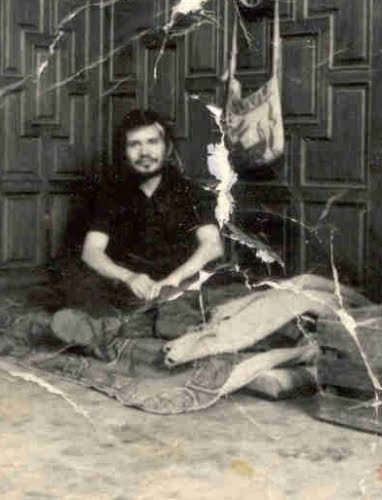
The following is a translation of a 1995 interview with Mario Santiago Papasquiaro, co-founder of the Mexican Infrarealist poetry movement. The original can be found here, among other places.
The dash-underlined bits of text in the interview are not links, but hovering over them for a moment with the mouse will result in additional information appearing. I have chosen this method in lieu of footnotes, which can be difficult to deal with online.
With regard to punctuation, it has mostly been preserved as it was given in the original linked above, except in cases where clarity was seriously lacking. There are a few mysterious quotations and line breaks that appeared in the original which are preserved here.

Mario Santiago Papasquiaro
Picture from here, a site with lots of other MSP pictures and some poems (in Spanish).
See also the First Infrarealist Manifesto.
My attention was drawn to this interview by this post at another blog, which contains some other links to things about Bolaño and Infrarealism.
The dash-underlined bits of text in the interview are not links, but hovering over them for a moment with the mouse will result in additional information appearing. I have chosen this method in lieu of footnotes, which can be difficult to deal with online.
With regard to punctuation, it has mostly been preserved as it was given in the original linked above, except in cases where clarity was seriously lacking. There are a few mysterious quotations and line breaks that appeared in the original which are preserved here.
By: Oscar Enrique Ornellas
Published in El Financiero, cultural section, 29 March 1995.
He wasn't born on Guerrillera Street in Colonia Aurora, nor on Ché Guevara Street in Benito Juárez. He assures me that he first saw light "in a clinic that doesn’t exist anymore, in Rafael Guillén Alley in Mixcoac." Mario Santiago Papasquiaro (Mexico, 1953) doesn't care that this alley is really called Guillain. Details. He is better than Bukowski, the true poet of Mixcoac, and will put anyone in his place, starting with Octavio Paz. "Víctor Roura is garbage (and Musacchio too)." Founder of Infrarealism, Santiago Papasquiaro is the author of "Advice from a disciple of Marx to a Heidegger fanatic" (in the volume Muchachos desnudos bajo el arcoíris de fuego [Boys Naked under the Rainbow of Fire], published by Editorial Extemporáneos). For Santiago, what's really important is friendship and, confirming this, he has now published Beso eterno [Eternal Kiss] (published by Al Este del Paraíso), a book of poems that will appear tonight at 7:30 at the Confederación de Educadores Americanos. In a strange pandemonium of words, Papasquiaro met with the cultural section in some place in Tlatelolco.
Why is your book called Beso eterno?
Read the book and then ask me questions.
But you wrote—
It's called Beso eterno in honor of my two year-old daughter, Nadja. That poem was written before she was born. I have three children… but, look, this isn't a psychiatry session… Nadja Clítoris was born years after I had decided to call it that. It's a prophetic poem. Back then I lived in Pensil. That was was when I started to work at El Financiero. There I met Marco [Lara Klahr], [Víctor] Roura, Mike... Then they fired me from this newspaper you work for.
Why did you take so long to publish again?
I'm 41. My first public reading was in 1973, when I was 19. I've been writing since I was a kid, but the first time I presented my writing publicly was after my grandmother died. I started in March of 1971 at the the poetry workshop at the University [Universidad Nacional Autónoma de México], which was coordinated by Juan Bañuelos on the tenth floor of the rectory, and in December of the same year, I don't know why, Oscar Olivia (who was then like director of literature in the School of Fine Arts) invited me to participate in the Manuel Acuña Centennial in the Fine Arts building. It was my first public reading... I've always lived outside the world and didn't understand why they invited me to do a reading in Fine Arts and on top of that paid me 300 pesos, which, for me, seemed absurd. I didn't get that they would pay someone to read a poem. And, besides, it was my first commissioned poem. Oscar Olivia told me: You have fifteen days, can you do it? And he was dangling the 300 pesos in front of only me and I told him hell yes, and I wrote a poem about 60 pages long. It was my first long-winded poem. My first solo reading was in the Museo de San Carlos on May 3rd of 1974. I wasn't born yesterday. And in 1975 I founded the Mexican Infrarealist movement. Around then they started to get sick of me, because I was confronting Pacheco, Monsiváis, everyone I know of. No one wants to give me a job. For four years I have no income. Sergio Mondragón has refused to give me a job because I'm an Infrarealist. They say I sabotage readings. They say the Infrarealists beat people up. And those idiots allege that I don't know how to write. Motherfuckers. I am l’ecrivain. But that's not important. Better if I read you some things...
What does Infrarealist mean.
Uh, no, you better find out yourself.
You are the founder...
Me and my friends. What happened is that I was a student leader, I founded the high school protest committee in San Ildefonso. I know all the history of guerrilla warfare and the Dirty War... I was Marxist-Leninist... At 19, I had the opportunity to meet José Revueltas and Efraín Huerta in their respective houses. I am their son. That's where I got my pseudonym, Santiago Papasquiaro, the village in Durango where the Revueltas brothers were born... For me, there are two fundamental clans, Revueltas and Flores Magón. I also have training in anarchy, a teacher in middle school told me to investigate the Flores Magón brothers and I liked it. I think they are the most illustrious families that have ever existed in Mexico. But all that doesn't mean shit...
So, would you like to talk about your work?
No, well, ask, ask... Do your job...
Last night this poem to Felipe was brought to my attention. Who was Felipe?
They killed Felipe Rojas 7 years ago. They put him on a farm for alcoholics in Puebla. Felipe is the best actor I have known in my life. And I didn't see it on stage or anything. Felipe is one of my dead, because I have many dead, I've written to some of them...
"In my 23 years of writing without stopping because I dedicated myself to it (putting up with all the bumps) I have published, at a guess, seventy-something poems, scattered all over the place... I lived in Barcelona, in Paris, in Vienna, and have published in Argentina, in Spain, in the United States, in Paris I gave readings. But with Beso eterno is the first time I decide the order of the poems. Often they've been published without my permission. I've never charged for publication, because they never made any money. Here, for example, you have an anthology Roberto [Bolaño] and I made in 1975, with a prologue by Efraín Huerta where he names me "Mario on the way to Santiago"... If anyone knows about Efraín Huerta it's me...
You haven't written poems against them like those that you did for Octavio Paz, Elenita Poniatowska, or Monsiváis and that nobody wanted to publish, right?
No, no, the poem for Efraín Huerta is a love poem. It's his biography. If we meet again someday I'll show it to you. It was published in El Financiero. It's a love poem. About what I know of his life because he told it to me. It's one of my most fantastic poems. Why haven't I published it in a book? Because I haven't had the chance. Why these ten poems in Beso eterno and no others, if I have these mountains of poems? Well, because that's how things went. I respected the idea that Marco Lara suggested to me. He's my amigo and everything else. And we're going to make some noise! I know how to respect a structure. And if you read the book carefully you'll notice that it's made up entirely of tributes to people. They're apparitions of beings...
"I have another, bigger book [Aullido de cisne (Swan's Howl)] that I've risked with CONACULTA. But I think they're going to reject me, because I'm on the black list. Although, also, the best thing is to publish these books underground..."
Getting back to your homages in the book, "Want to dance / baby?" is dedicated to "the nurturing memory of Miles Davis." What nourishment did the trumpeter contribute?
I heard about Miles Davis in Paris with my friend Elías Durán, a poet of the Hora Zero movement in Peru, which is another of my inspirations. In reality I am a Peruvian poet born in Mexico. Peru's Hora Zero is the most radical Latin American poetic movement of this century; and we founded the Infrarealist movement (as kids less than 20) immediately when we heard about those guys... In Paris I lived in poverty. When I returned to Mexico I weighed 40 kilos [80 lbs.]. But I wasn't weak, because I had always walked a lot, there and in this damn whore city... And Elías Durán was a friend, we stole tapes from Fnacs, these huge stores they have in Paris. We were a couple of badasses. We understood each other with one look. They never caught us, but what was the question?
Miles Davis.
Because of Elías Durán. In the tiny room where he lived I heard Miles Davis for the first time. I don't know shit about the club. It's the nurturing memory. It was the stealing and all that. Otherwise, you're not alive, you can fuck off.
Are you The Poet, as the painter Rodolfo Zanabria called you?
Zanabria's... But no, I'm not going to talk about Rodolfo's life because right now I'm writing the introduction to his catalog. He's going to have an exposition in the Carrillo Gil [Museum]... He's the one who gave me this title of Le poète. One day when I was in New York he sent me a postcard of the skyscrapers, and on the envelope, on the outside, instead of putting "señor" and all that shit, he put "to the poet," in French, because he's very Frenchy. My reply is in this poem... but, it didn't really come out well in Marco Lara's edition [of the poem book], did it? He's pissed that I didn't think he could become an editor, least of all an editor of underground poetry. Because that's what we are...
Your friends, your daughter... the punk rebel, the love of your life, who has the most distinguished place in your life?
My wife, Rebeca. We met on the 29th of August, 1987 at a reading that I gave in the cafeteria of the Fine Arts building. Lots of my friends have died because they didn't have anyone tying them down. I've been lucky enough to have some women who believed in me. Otherwise, I would have already been gone, too.

Mario Santiago Papasquiaro
Picture from here, a site with lots of other MSP pictures and some poems (in Spanish).
See also the First Infrarealist Manifesto.
My attention was drawn to this interview by this post at another blog, which contains some other links to things about Bolaño and Infrarealism.




